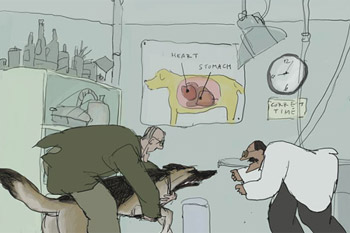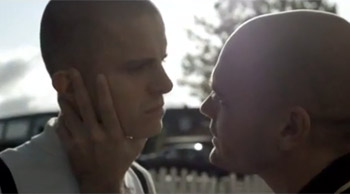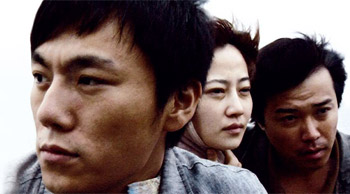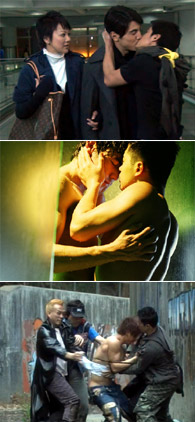The appearance of the Hong Kong International Film Festival (HKIFF)’s programme is always greeted with interest by the LGBT community. The Festival has never been shy of showing films which are edgy or avant garde and has often included queer films in its lists. I should point out straightaway here that Hong Kong has four general film festivals (the HKIFF, the Hong Kong Independent Short Film & Video Awards, the Hong Kong Asian Independent Film Festival and the Hong Kong Lesbian and Gay Film Festival) as well as a host of more specific festivals (like the French, the Israeli and the like). The HKIFF is the biggest. This year is the 34th HKIFF, with a schedule running from 19 March to 6 April in many cinemas around the city (with some films running on into extra time as far as May), and the organisers chose to show four gay films. One of them has caused a storm.

The first of the four was scarcely noticed as a gay film at all. This was My Dog Tulip (above), a cartoon rendering by directors Paul and Sandra Fierlinger of the 1965 novel of that name by JR Ackerley, the English novelist and long term editor of the BBC magazine, The Listener, who gave up a lifetime of cruising to devote his late middle age to his Alsatian bitch. In the film, Ackerley’s voice is sensitively spoken by Christopher Plummer, and the cartoon faithfully reproduces Ackerley’s ‘menstrual fluid, faeces and all’ honesty in the portrayal of what was sadly the only successful love affair of his life. That aside, the cartoon has some evocative scenes of a vanished London and the idyll of the English countryside. Save for one easily missed line, though, in which Ackerley abandons his long and fruitless search for a ‘special friend’, you’d never know this was a gay film at all!

In contrast, the second of the four gay films leaves nothing to the imagination. Brotherhood (above) is a Danish film by new director Nicolo Donato. It took Best Film at the Rome Film Festival and is shown here in its Asian premiere. The brotherhood of the title is a Danish neo-Nazi party that takes out its prejudices in violence against immigrants and queers yet which harbours hidden within its ranks men attracted by the masculinity, the thuggery, the violence and the homoerotic way of life it offers. Lars, whose career as an army sergeant has been ruined by allegations that he made sexual advances towards the men of his platoon, drifts into this group and falls for Jimmy, one of the most intense and violent of the members. They fall for each other and the audience is not disappointed of the expected violent outcome. An uncomfortable and at times horrifying film, appropriately shot in dark, grainy tones, this is a movie that lifts the lid on one of the dark sides of same sex attraction.

Chinese director Lou Ye’s Spring Fever (above) won Best Screenplay recently at Cannes, in part for the passionate sex scenes the film contains. These are steamy! Shot with a rather jerky hand-held camera, this is a gay love triangle set in the gradually opening society of modern China. Lou is no stranger to controversy. His 2006 film Summer Palace, a straight love affair set against the background of the Tiananmen Square protests of 1989 and their suppression on 4 June of that year, brought him a five year ban from the Chinese censor.
The Hong Kong censor has less power, but has nevertheless the means to prevent or mar the showing of a film, which is what has happened to the fourth of the gay films shown this year at the Festival, Hong Kong director Scud’s Amphetamine. The film was runner up for a Teddy in Berlin and is here in its Asian premiere, chosen by the Festival as the closing film on 6 April. Tickets for this sold out completely. More rapidly once it was known that this would be the only complete showing of the film allowed in Hong Kong.

The Hong Kong censor (the Television and Licensing Authority – TELA) classified the film as III (for those over 18 only) for the Festival. All seemed well, and the film was due to open in commercial cinemas on the 8th, but for this it needed another license, and inexplicably this time the TELA demanded five cuts, each of five to six seconds, in the crucial scene, a male rape. The story of the film centres around the addictions in love and drugs of its fallen angel, swimming instructor Kafka (played by the very cute Byron Pang), a straight man who finds himself in a love affair with a gay executive, Daniel (the more classically handsome Thomas Price). The film is a dark meditation on love and its bonds, on death, betrayal and the loss of innocence, and, without giving too much of the story away, the scene in which Kafka is raped forms the crux of much of what happens thereafter.
Scud’s film company, Artwalker, has appealed the ruling, but in the meantime Scud was faced with the choice of withdrawing the film or showing a damaged version. He has chosen to do the latter in the hope that the five black spaces he will leave in it will arouse sufficient attention that the TELA will be persuaded to change its mind. This it may very well do, as public indignation has already begun to grow in Hong Kong. Articles ridiculing the censorship have appeared in the popular Chinese press (Apple Daily and Mingpao) and a Facebook group has been formed to fight the case (check it out on Facebook).
The issue upon which the TELA censored the film, according to the fax by which they announced their decision on 24 March to Artwalker, was the depiction of pain on the face of the rape victim, not the rape itself. The TELA ordered them to delete the close up of the painful reaction on Kafka’s face on each of the five occasions it was shown. Yet they allowed the rape itself to remain. So, it’s official, male rape and torture are OK, as long as the victim isn’t seen to be objecting to it. Or maybe, harrowing male rape is OK at a film festival, but not in the cinema near you. It’s very hard to see the logic here.
This extraordinary set of rulings probably won’t stand in the long run but they do indicate the need for a revision of Hong Kong’s censorship laws. The TELA’s work is done in part by volunteers, and it is the rare liberal who would volunteer for this sort of duty. The two different panels which reviewed Amphetamine seem to have had different views. The Ordinance which governs the TELA and the guidelines for its censors are at: http://www.tela.gov.hk/english/code.htm. Section 10 (2) of the Ordinance obliges the censor to consider depictions of ‘cruelty, torture, crime, horror, disability, sexuality or indecent or offensive language or behaviour.’ Guideline 36 (b) explicitly holds ‘depiction of sexual violence or sexual acts under coercion or non-consent of any kind’ as acts which ‘are commonly held to be injurious to the community’s well-being or likely to endanger public health or morals, or to offend accepted standards of public decency’. Though the TELA’s directive to Scud failed to state the regulations they considered he had breached, it is most likely that the excisions were ordered under this Guideline.
The Ordinance is up for review soon; if you don’t like what it says and what it has resulted in so far, you will soon have the chance to say so.
No publicity is bad publicity, though, and the TELA’s decision has made it inevitable that a lot more Hong Kong people will be watching Scud’s scenes of male rape when they hit the cinemas than would have dreamed of doing so before. The HKIFF will not, I suspect, be the last chance for us to see the film in full.
